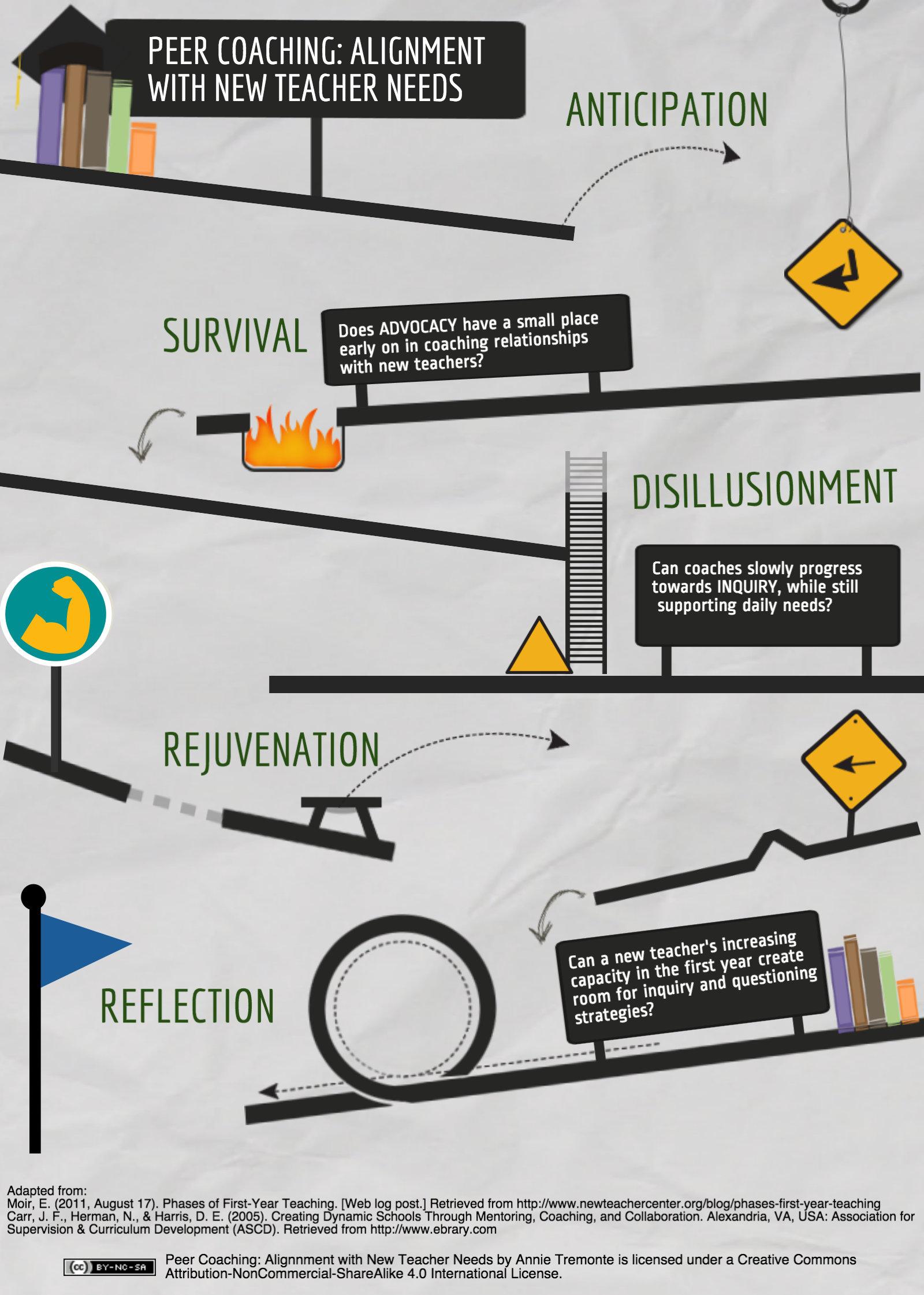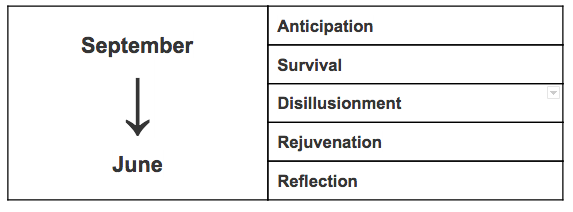This week in the Digital Educational Leadership program at Seattle Pacific University, I am exploring the roles of communication and collaboration in peer coaching as they align with ISTE Coaching Standards 1 & 2. Foltos (2013) asserted that effective communication and collaboration in a coaching relationship, “emphasize[s] inquiry over advocacy” (p. 87). He stated that reliance on advocacy can result in too much reliance on a coach’s expertise (Foltos, 2013). Instead, inquiry and feedback cycles between collaborating partners build capacity for autonomous problem solving, which serves to best meet student needs (Foltos, 2013).
For better or for worse, new teachers have the same amount of responsibilities that veteran teachers do. Additionally, they have to learn these responsibilities in real time. While coaches desire to build a new teacher’s capacity, it is still all too easy to advocate when daily problems need solutions. Unfortunately, reliance on advocacy puts the coach in the role of perpetual expert (Foltos, 2013). While I am not an expert in all realms, I do have an expertise that could be useful to a new teacher. On the other hand, I don’t want to influence a teacher too heavily from my one set of experiences and perspectives. Where is the balance between inquiry and advocacy in a coaching relationship with a new teacher?
How do you promote inquiry over advocacy, given the vast amount of new information new teachers need to acquire daily?
Building Capacity Through Questioning Strategies
Foltos (2013) analogized that coaching is like training someone to rock climb. Just like a rock climber needs to be able to take a risk to grab the next hold, so too does a teacher need to be able to independently decision-make in the classroom (Foltos, 2013). Various communication strategies can be used to build this independent capacity.
Active Listening
-allows coaches to fully and clearly understand the teacher’s needs, rather than to see to immediately advocate for particular solutions (Foltos, 2013).
Paraphrasing
-focuses the communication on the teacher’s needs and perspectives (Foltos, 2013). –
Clarifying questions
-allow the coach to fully interpret the situation (Foltos, 2013).
Probing Questions
-allow coaches to guide teachers to explore problems at a deeper level (Foltos, 2013). The use of probing questions not only replaces the need for a coach to hold all of the answers, but is really the root of the inquiry process. Probing questions incite brainstorming for how to solve problems independently. Foltos (2013) wrote, “Probing questions are the key to inquiry-based learning and are essential for Peer Coaches who want to avoid advocating for a solution based on their ideas and experience” (p. 87).
While these questioning techniques are clearly an important piece of building capacity, how do they fit into the daily, ongoing support of new teachers? New teachers may not have the time and energy to answer endless probing questions, or may be left frustrated by them in a time of need.
Focusing on the Student Over Self
Athanases (2013) asserted that new teachers must shift their professional development away from a focus on themselves and onto a focus on the students. He drew on research to show that inquiry focused on student learning can impact instruction and wrote that “Too often mentoring gets cast as expert teachers providing advice to novices” (Athaneses, 2013, p. 40). Like Foltos, Athanases (2013) suggested that questioning methods can guide new teacher’s analysis of student achievement, as well as frame how new teacher problem solve independently over time. Heavy demands placed on new teachers mean that they need help even identifying problems to solve, which is why mentors can help them to problem-frame, which can also build capacity to see patterns (Athanases, 2013).
Teacher Preparation Can’t Do It All
Finally, Donnell and Harper (2005) examined how inquiry methods can prepare student teachers for the real world setting of their own classroom. Just as Foltos (2013) indicated that inquiry builds capacity, Donnell and Harper (2005) suggested that inquiry builds autonomy. Theoretical ideas learned in coursework do not necessarily prepare new teachers for daily practice. Asking questions and reflecting on practices allows new teachers to think like independent teachers do, and less like student teachers do (Donnell & Harper, 2005). Most would agree that professors, mentors and coaches can never fully prepare teachers for the classroom (Donnell & Harper, 2005). What can be taught is the ability to reflect about one’s own practice and decision-make responsively (Donnell & Harper, 2005).
However, new teachers want to receive and experienced teachers want to provide, “practical and immediate solutions to day-to-day problems in the classroom” (Donnell & Harper, 2005, p. 158). Unfortunately, this can prevent engaging in the practice of inquiry altogether. Donnell and Harper shared research findings that highlighted this struggle.
The daily realities of teaching also presented obstacles and disincentives to inquiry. Many student teachers wanted definitive, a-contextual solutions and were initially resistant to the cognitive engagement required for inquiry (Donnell & Harper, 2005, p.161).
Where is the balance between daily support and inquiry?
Despite all of this solid research supporting methods of inquiry and capacity building, I am still unsure how to negotiate the balance between inquiry and advocacy for a first year teacher. I am encouraged to know that coaches are not intended to champion for big instructional shifts (Foltos, 2013). Instead, inquiry-driven coaching relationships are intended to support ongoing, low approach change (Foltos, 2013). Inquiry is also not intended to be time-bound, but continuous. Therefore, perhaps the coaching of a new teacher can fall into two categories, with norms established to support each. On one hand, coaches can provide guidance on institutional knowledge, suggest curricular aids, and attend to drive-bys, check-ins or just-in-time support regularly. On the other hand, ongoing inquiry-based coaching can the focus of separate meetings. Separating these roles can create space for both, without shortchanging either.
Timelines and Teaching Phases
After sharing my initial resources and reflections, my graduate colleague Marsha Scott, directed me to another great resource. Carr, Herman and Harris (2005) wrote that “mentoring programs enable and encourage novice teachers to grow and change as they create their own questions and find their own answers in a supportive environment” (p. 17). After reading this, again I was left wondering- “How?”
Carr et al. (2005) identified six areas of critical focus for new teachers being mentored. Why are these important? Returning to my question about inquiry over advocacy, it became clear that some of these areas of focus are better met with droplets of advocacy, while others are better met with inquiry. My chart below depicts this progression.
Additionally, Carr et al. (2005) referenced the five phases of a new teacher, originally identified by Moir (2011). My second chart shows the alignment of the phases with the school year.
Moir wrote that new teachers progress through these phases over the course of their first year, with rejuvenation and reflection only arriving in January and May respectively (Moir, 2011). As such, survival and disillusionment blanket the first chunk of the school year and supporting new teachers by offering potential solutions can ease the transition. According to Carr et al. (2005), collaborative processes struggle to even find a place in a first year mentoring relationship. It is suggested that true peer coaching finds its place closer to January, as new teachers are less overwhelmed by systems and daily problem solving needs by this point (Carr et al, 2005). After the initial onslaught of information has had time to digest, more energy and time exists for independent reflection. Then, inquiry and collaboration can slowly be introduced.

Resources
Athanases, S. Z. (2013). Questioning and Inquiry in Mentoring New Teachers of English: A Focus on Learners. English Journal, 102(3), 40-48.
Carr, J. F., Herman, N., & Harris, D. E. (2005). Creating Dynamic Schools Through Mentoring, Coaching, and Collaboration. Alexandria, VA, USA: Association for Supervision & Curriculum Development (ASCD). Retrieved from http://www.ebrary.com
Donnell, K., & Harper, K. (2005). Inquiry in teacher education: Competing agendas. Teacher Education Quarterly, 153-165.
Foltos, L. (2013). Peer Coaching: Unlocking the Power of Collaboration. Thousand Oaks: Corwin .
Moir, E. (2011, August 17). Phases of First-Year Teaching. [Web log post.] Retrieved from http://www.newteachercenter.org/blog/phases-first-year-teaching



You did a wonderful job explaining the importance of inquiry over advocacy! Your section on, “Timelines and Teaching Phases” helped me to distinguish the areas of when inquiry and advocacy are appropriate when mentoring a new teacher. The five phases that align with the school year, beginning with anticipation in September and ending in June with reflection, seems like a manageable plan to follow. Great job exploring this area of peer coaching, Annie!
Thanks so much for this crucially important post, Annie. Your struggle–and question–is exactly one of the same concerns/struggles I’ve had. Your addition of Carr et. al. and Moir are very helpful in understanding the role of a peer coach during a new teacher’s first year. You write, “Returning to my question about inquiry over advocacy, it became clear that some of these areas of focus are better met with droplets of advocacy, while others are better met with inquiry.” I love the image of “droplets” and that is something attainable without becoming unhelpful–which is one of my fears of peer coaching with too much inquiry.
Great post, Annie. I was struck by your question about finding balance between inquiry and advocacy. How do we, as not brand new educators, provide guidance while also serving as a peer coach that isn’t meant to be the expert. It’s a tough position to be in and you did a nice job of highlighting the importance and balance of doing both. Like Ryan, I was especially interested in your findings on Carr and Moir, this was my first time seeing the year on a continuum like that and it is a helpful way to think about the progression of the year.